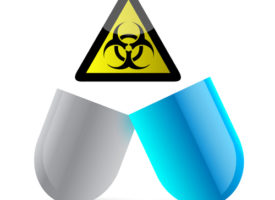In last week’s blog post we talked about how the dangerous drugs used to treat depression, anxiety, diabetes, and osteoporosis do far more harm than good. In part two of this discussion, we’ll look at another class of dangerous prescription drugs and I’ll share some safe, natural alternatives for treating all of these health concerns.
Statins Increase Risk of Heart Failure
Elevated LDL cholesterol is a widely accepted risk factor for cardiovascular disease, and the purpose of cholesterol-lowering drugs is obviously to prevent heart disease. These medications make sense, until you realize that the runaway best sellers in their class—statins like Lipitor, Crestor, and Zocor—are among the most dangerous prescription drugs out there.
Statin drugs reduce cholesterol levels by blocking an enzyme pathway called HMG-CoA reductase that is involved in cholesterol synthesis in the liver. This is the same pathway the body also uses to produce coenzyme Q10 (CoQ10), a vital compound required in the generation of cellular energy. Studies show that CoQ10 levels decrease by 40–50 percent after just one or two months on a statin, and this decline adversely affects every system in your body. Most severely impacted are the organs with the greatest energy needs, including the heart. When the heart’s energy stores run low, it cannot pump efficiently, so it’s no surprise that CoQ10 deficiencies are linked to heart failure. A low blood level of CoQ10 is also an independent predictor of death in patients with cardiovascular disease.
Nevertheless, conventional medicine is infatuated with these dangerous drugs. Revised treatment guidelines no longer require a history of heart disease to warrant a statin prescription. You don’t even need a high cholesterol level. Diabetes, obesity, and other risk factors for heart attack and stroke are now enough to “qualify” you for a lifetime of statin dependency.
This is absurd. You don’t need dangerous prescription drugs to lower cholesterol. A safer, saner approach to preventing heart disease is to make lifestyle changes, lose weight, and start on a comprehensive nutritional supplement program that not only lowers cholesterol and reduces inflammation but also addresses other cardiovascular risk factors (see below).
You Must Protect Yourself
The medications we have discussed in these blog posts are just a few of the prescription drugs that do more harm than good. Nonsteroidal anti-inflammatory drugs (NSAIDs), commonly used to relieve arthritis pain, contribute to cartilage degeneration. Cancer survivors, especially children, who’ve had chemotherapy or radiation have an increased risk of developing a secondary cancer caused by their previous treatment. Proton pump inhibitors (PPIs) such as Nexium and Prevacid, used to treat symptoms of gastroesophageal reflux disease (GERD), can cause rebound effects that make heartburn and indigestion worse when they are discontinued—and studies suggest that more than half of the prescriptions written for these drugs are inappropriate!
Folks, you must protect yourself from dangerous drugs. Medical schools are virtually owned by the drug companies, and from the onset budding physicians are “tutored” by Big Pharma and trained to prescribe. Students who do well in this environment become authority figures and opinion leaders, and they’re paid well to extol the benefits of a never-ending stream of pharmaceuticals. If you think this assessment is harsh, let me remind you that appropriately used drugs, prescribed by physicians, kill well over 100,000 Americans every year.
Become more actively involved in decisions involving your health. After all, it’s you, not your doctor, who must suffer the consequences. Question each and every drug that is prescribed. Is it absolutely necessary? What are the potential side effects? How does it interact with other medications you’re taking? And, most important, are there safer alternatives? Bottom line: Don’t be scared or bullied into treatments that worsen your disease.
Safe Alternatives to Dangerous Drugs
It just doesn’t make sense to take side effect–riddled medications when there are safer alternatives to these dangerous drugs. Make low-glycemic vegetables, lean protein, and healthy fats your dietary mainstays. Participate in some form of physical activity for at least 30 minutes most days of the week, incorporating both aerobic and strength-training exercise. Finally, take a high-potency daily multivitamin and mineral formula and, when appropriate, add the following natural therapies.
Depression:
Bioidentical Hormone Replacement (requires a prescription); SAMe 200 mg twice a day, building up to 800 mg dosages, if needed; Fish Oil 2–8 g daily; St. John’s Wort 300 mg three times a day (check with your doctor before using this herb, as it interacts with a number of prescription and over-the-counter medications).
Diabetes:
Berberine 500 mg, twice per day; Vanadyl Sulfate 100 mg daily in divided doses; Chromium 200–400 mcg per day; Cinnamon 1 g daily.
Osteoporosis:
Bioidentical Hormone Replacement (requires a prescription); Vitamin D3 2,000–5,000 IU per day (enough to bring blood levels into the 50–80 ng/mL range); Vitamin K2 (MK-7) 150–300 mcg daily (talk to your doctor if you are taking Coumadin or other blood thinners); Calcium 1,000–1,500 mg per day; Strontium Citrate 680 mg per day taken two hours before or two hours after eating or taking other supplements, especially calcium.
High Cholesterol:
Bergamot 500 mg once or twice a day 20–30 minutes before meals; Niacin 500–2,000 mg daily (high-dose niacin is best used under a physician’s care); Red Yeast Rice 600–1,200 mg (taken with 100 mg of coenzyme Q10) two times a day; Fiber (from flaxseed, glucomannan, or psyllium) 30–35 g daily including dietary fiber; Fish Oil 2–8 g per day.
If you are currently taking prescription drugs, talk to your physician about replacing them with the safer alternatives listed above. If he or she won’t work with you, find a doctor who will. A directory of integrative physicians is available at acam.org. If you’d like to schedule an appointment at the Whitaker Wellness Institute to review your medications and develop a program of safe, effective, drug-free therapies, call (866) 632-8890. All of these supplements can be found in health food stores, purchased online, or ordered by calling (800)810‑6655.


